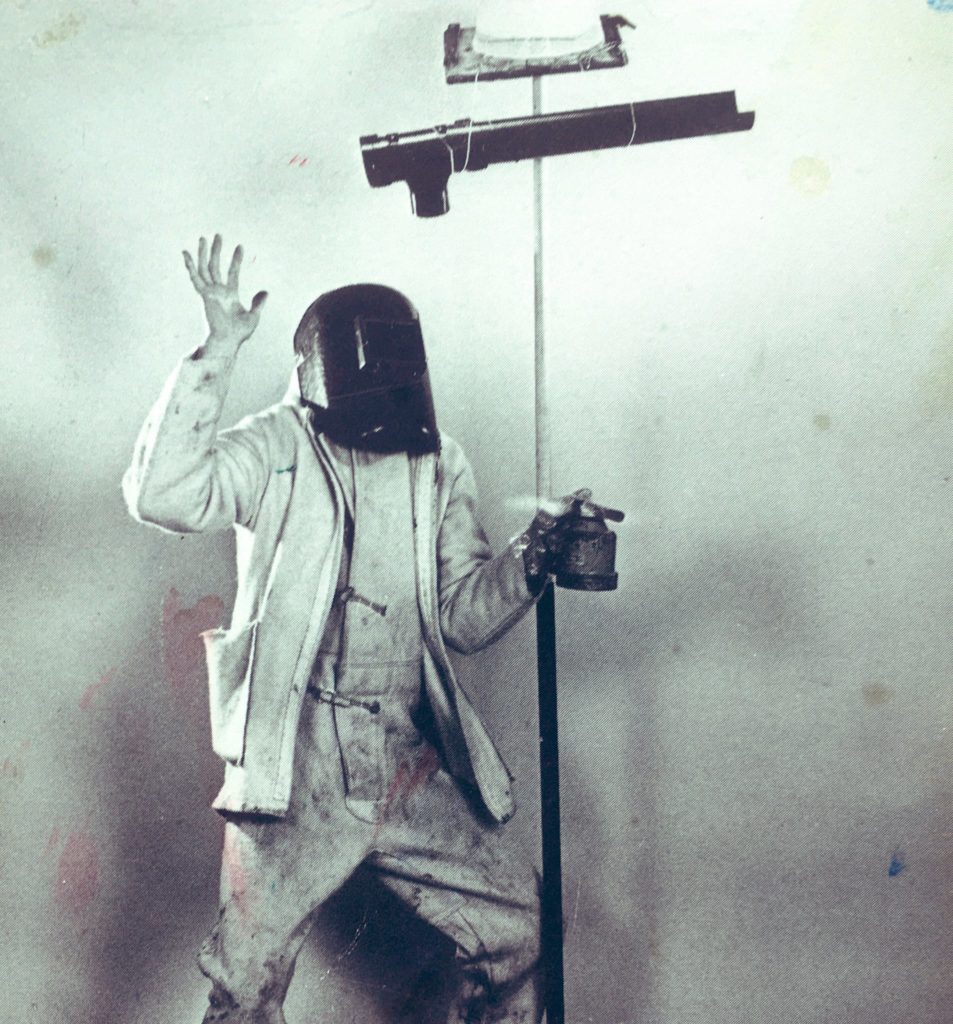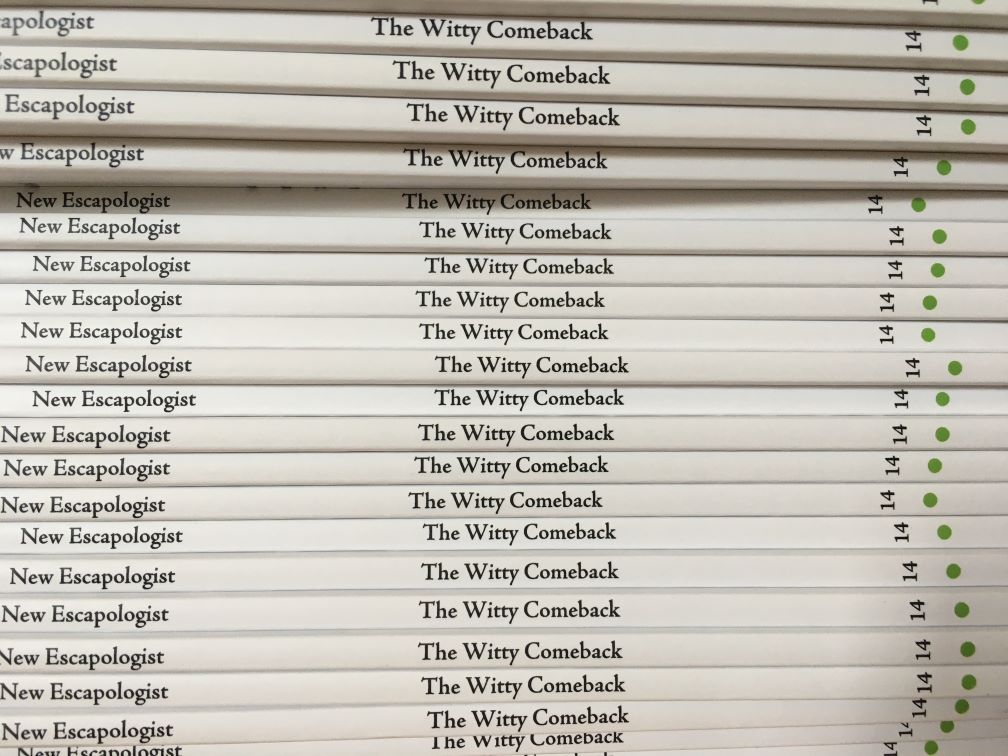Outsiders

The “final” issue of New Escapologist in 2017, before our triumphant return earlier this month, was subtitled “Outliers.”
The idea was to celebrate outsiders. By definition, outsiders are successful Escapologists. They’re on the outside. They’ve escaped.
Reader Tom draws my attention to Rolf Dobelli’s book The Art of the Good Life in which Dobelli writes:
Outsiders enjoy a tactical advantage. They don’t have to adhere to establishment protocols which could slow them down. They don’t have to dumb down their ideas with visually snazzy [and] ridiculous PowerPoint slides.
They can happily ignore convention and are under no pressure to accept invitations or take part in events simply to “show face”. […]
What’s more, their position off the intellectual track sharpens their perception of the contradictions and shortcomings of the prevailing system, to which members of the club are blind.
I think that’s correct, which is why in Issue 14, I interviewed the Iceman.
The Iceman is probably the ultimate outsider and I love him so much that I wrote a whole book about him last year. Thankfully this wise prodigy had a little more to say and I was glad to speak to him again.
Reader Tom writes: “Look to the outsiders. The groups of people on the fringes or dabbling in areas which aren’t mainstream. They have aces up their sleeve which they might be willing to share.”
I’d go one better. Learn from outsiders. But also, be an outsider.
Witnessing the lives of outsiders is what turned me into an Escapologist in the first place. I had a day job in an office while spending my evenings doing stand-up comedy and reading about performance history (including the history of magic, which switched me onto Houdini). On the evenings I’d meet people who truly didn’t give a shit: they didn’t care about making enough money, they had no lofty goals, they just entertained and intrigued and worked on their act. Unlike the people in the office and unlike half of myself, they had integrity.
*
Inner Weirdo

I’d been looking forward to reading a book called Solitude: In Pursuit of a Singular Life in a Crowded World. Life is too crowded, too busy, too loud. And I wondered if the book might contain some solutions for Escapologists.
In the end, I didn’t enjoy the book at all. It barely feels like a real book; almost like one of those prop books you might see in Ikea to make a bookcase look nice on the display.
The biggest problem is the author’s fixation on technology. He deploys it usefully enough in the first couple of chapters to illustrate the problem of the crowded world through tech-enabled connectedness, which is fine as it goes, though even at that early stage I was thinking “but that’s only one of the problems, what else have you got?”
He returns to it time and time again, boringly explaining the basics of Twitter Analytics, emoji, and Rotten Tomatoes as if we’d never heard of them. I assumed the book must be old, perhaps from 2006, but the copyright page shows a publication date of 2017. It’s very odd.
I cheered up a bit when Quentin Crisp made an appearance in Chapter 5. The author seems to find Crisp’s wit and defiance personally important and some of his passion is on the page. But then we’re back to moaning about the Internet after four short pages of circling some rather basic ideas about conformity and individualism.
Anyway, there is the occasional nugget of something. For example, I like this moment, which is buried in the middle of the book at the end of a boring digression about whether “smart” thermostats can have beliefs and tastes (they can’t: it’s just anthropomorphism, though the author never says this):
today we need to safeguard our inner weirdo, seal it off and protect it from being buffeted. Learn an old torch song that nobody knows; read a musty, out-of-print detective novel; photograph a honey-perfect sunset and show it to no one. We may need to build new and stronger weirdo cocoons, in which to entertain our private selves. Beyond the sharing, the commenting, the constant thumbs-upping, beyond all that distracting gilt, there are stranger things waiting to be loved.
(I didn’t know what an “old torch song” was; I thought maybe the author was into a defunct indie rock band called Torch whose name should be styled with a lower-case “t”, but apparently it’s a genre of love song. Cool.)
I agree with what he’s saying here but only up to a point. Escapologists should avoid the strong force of common opinion by way of protecting our minds and nurturing our own insights. Reading books or watching films properly or restfully playing the violin instead of gawping at the television, for example, is indeed something we’ve talked about before.
It’s better for you (because who wants to be a zombie, merely reacting to whatever comes along?) and better for the world (because society needs individual thinkers and contrariains and, if nothing else, a control group). But we don’t need to “safeguard our inner weirdo” for its own sake exactly. Instead, courting internal uniqueness happens naturally, emerging almost as a by-product of our bigger projects.
When you’re working on an escape plan to say goodbye to the office or if you’re trying to build the creative muscles to write your first novel, the inner weirdo will thrive of its own volition.
Don’t worry about the claptrap of the digital or workaday worlds. Just ignore them and do your own beautiful thing.
*
Epub Blues

Some of our digital editions (in the epub format) don’t read very well on certain devices. Sigh.
You might have seen an error screen like the image above instead of a nice cover page. You might also get problems with some of the line breaks.
To this I say: Grr.
For much of our original run, people would ask after digital editions. For a long time I said “NO! There will be no digital edition under any circumstances! New Escapologist stands against screens and electronic gizmos.”
To which some people would say: “But what about minimalism?”
To which I would say: “I see what you mean but even minimalists own some books. Have our periodicals among your treasured possessions. Or pass them on once you’ve read them. Ebooks are the devil’s dinner.”
But then others would say: “For me it’s about access. I can’t read the printed page. I need to be able to zoom in on the text.”
To which I would mumble: “mm, okay, fair enough.”
I don’t want to exclude anyone from our blistering wit and wisdom. So I made our future editions and back issues available in PDF. For minimalism and for access.
But even then, some people said they wanted epub since this is apparently the best format for embiggening text and hopping between items in a table of contents. Honestly, Gutenberg didn’t have to contend with any of this.
This time around, in advance of Issue 14, I tried to get the epub format nailed down, despite not really understanding or liking or believing in it. This is why there are errors. I’m not entirely sure what to do now.
I’m tempted to offer PDF as the only digital format from now on. They work on every device so far as I know and they have the happy bonus of displaying the work as it’s supposed to look. A lot of thought goes into the design of the print editions, you know, and the epub format strips all of that thought and craft and beauty away.
On the other hand, I don’t know if PDF meets the accessibility requirements of most people who need it or if it can have the metadata useful to digital library platforms.
What do the digital media preferers among you think? Here’s a quick survey, open for the next month.
The Escape of Ariel Anderssen
This one’s a bit NSFW (though the idea that anything on this site might be “safe for work” is obviously hilarious) so by all means skip this one if you can’t be doing with sauce. The story was fit to print in the Guardian though, so we’re not talking about anything red hot. And there are no pics in this post, only text.
Ariel Anderssen escaped the Jehovah’s Witnesses as a teen. And then grew up to become a BDSM model.
The piece doesn’t go into detail about how she escaped (I think her family might have just left) but the world of the JW’s sounds pretty restrictive:
Dressing modestly was important. I learned that masturbation was wrong many years before I found out what it actually was. Men were the heads of our households, and women weren’t allowed to pray out loud, address the congregation, or even handle the microphones we used at our meetings.
At nine years old, I knew that oral sex, gay sex and extramarital sex were all just as sinful as blood transfusions. My future stretched ahead of me, into eternity, hemmed in on all sides by rules.
I knew a Jehovah’s Witness once. As teenagers, we worked together in a video store. She was engaged to be married, which meant she’d soon have to quit the job and become a stay-at-home wife. Given my famous aversion to work, you might be surprised to hear I found this a tad depressing. She was a driven, energetic, social person and I couldn’t imagine her nursing babies at home all day not by choice but because a fringe denomination of Christianity demanded it of her. No amount of hinting at the alternatives (okay, lurid and imaginative flirting) on my part could change her mind. She seemed happy enough in her church.
Ariel, evidently, was not. And the world she escaped into was thrilling but confusing:
my new world spun with giddy freedoms. Skateboarding on Sunday mornings, my first pair of jeans, trying out swearing like my school friends. But with the freedom came uncertainty. If the JWs had been wrong, how could I trust anyone to tell me how to live?
One day, on seeing an exhibition of erotic art at a gallery, she moved into BDSM modelling. Ironically, through a creative practice that involved being tied up, she found freedom, personal agency, and even love.
Ariel has written a book. I’m certain there will be a movie version eventually. I mean, there’s got to be, right? From restrictive orthodoxy to liberating creative practice via literal bondage, if this is not a tale of Escapological victory, I’m not sure what is.
*
A Treat for Future You
I used to listen to a comedy podcast called The Parapod. It was about the paranormal and presented by two comedians: one a believer in any old rubbish and the other a rational sceptic. The believer, Barry Dodds, was generally ridiculed as a gullible thicko even aside from his belief in El Chupacabra.
It was always very funny and Barry was a good sport. But, baseless belief in vampires aside, I was often left thinking “but, Barry’s got a point there. It was just a bit strangely articulated.”
On one memorable occasion, he described making tea before bedtime and putting it in a Thermos for the morning. He described it as “a treat for future me.”
This was good ammunition for his opponent who ridiculed him for thinking in those terms. Most people would, for example, fold their laundry without thinking of it as “a treat for future me.”
But getting things done sort of.. is a treat for future you. Isn’t it?
Getting things done today improves your life (or the lives of others) tomorrow.
Celebrated wise man and New Escapologist columnist David Cain picks up the subject at his blog today. He does not use the phrase “a treat for future me” because he’s more articulate than poor Barry. Instead, he writes:
Imagine you’re having a hard day, and you get home to find that someone has left dinner for you. It’s exactly what you wanted. Lasagne! Or maybe green curry, or tacos. […] Of course, this thoughtful benefactor could be you, just earlier.
He goes on to give more significant examples than lasagne or a Thermos of tea. Perhaps you past self wrote a book or got a degree or invested some money. They did something difficult for you. If you’ll pardon my weak pun, it’s a present for the future.
Anyway, David also says:
This sort of inheritance represents real wealth — consisting of personal freedom, money, resources, skills, relationships, and overall well-being — and you can pass it on to yourself.
The whole post is interesting and worth reading. He explains the “catch” of having to do things now in order to benefit from them later. And how to actually do the difficult thing of doing. But what interests me as an Escapologist is his definition of freedom.
He’s right. It’s real freedom. The only reason my days aren’t a living Hell today is that I put in the legwork yesterday and the day before and ten years ago. Rarely does a day at Escape Towers see an act of manic brinkmanship: I take everything in my stride and, largely, do what I want went I want to do it. I am the inheritor of many, many treats for future me.
Compare and contrast this idea of freedom with what Joan Didion once observed about the American idea of freedom (in Slouching Towards Bethlehem, 1968) via their then-idolisation of multimillionaire Howard Hughes:
That we have made a hero of Howard Hughes tells us something interesting about ourselves […] that the secret point of money and power in America is neither the things that money can buy nor power for power’s sake (Americans are uneasy with their possessions, guilty about power, all of which is difficult for Europeans to perceive because they are themselves so truly materialistic, so versed in the uses of power), but absolute personal freedom, mobility, privacy. It is the instinct which drove America to the Pacific, all through the nineteenth century, the desire to be able to find a restaurant open in case you want a sandwich, to be a free agent, live by one’s own rules.
I think it’s possible in 2023 to get those wires crossed. I think people today idolise the Kardashians (who whoever it is now) because, on some level, they’re hungry for Didion’s “absolute personal freedom, mobility, privacy” but getting caught up on the material wealth they see on the screen or how their bodies look compared to theirs. I could be wrong. But it’s what I suspect.
So be like David Cain and Barry Dodds: send presents to the future — treats to future you — in order to maximise your freedom, not the material things or the power that money can buy. Those are dubious treats for future you.
*
For further meditations on freedom versus The Trap, subscribe today to New Escapologist magazine.
Stayin’ Alive

This is boring news but… we changed our business model. I want to explain why and, who knows, maybe some of you will be interested in this behind-the-scenes glimpse into an Escapological business practice.
In the old days of the magazine (Issues 1-13), we used a print-on-demand service to satisfy every single sale. Well, the first fifty or seventy copies were delivered to my flat and I’d personally ship those ones to subscribers. But after that, an order would come in for a single issue and I’d essentially forward that order to the printing service.
The main advantage of fulfilling orders this way was that I didn’t need to hold inventory. I was very mobile at the time, flitting between Glasgow and Montreal and also travelling a lot, so boxes of magazine stock would have been quite the encumbrance.
The main disadvantage, however, was that it didn’t make any money. The profit margin on a £6 issue was maybe £1.50. So if I sold, say, 200 copies, I’d “make” £300. This would usually go towards printing the next batch of subscriber copies. We always said “New Escapologist makes no money” and it was true.
This time around, I want to make a small amount of money from the magazine. For myself, that is, not for a company or anything. It’s very, very hard to make money from books or magazines and the effort I put into it all is stupendous. Don’t get me wrong, I enjoy it all, but I need about £6,000 of income a year to stay alive and it makes sense for that money to come from my bookish exertions and not from some stupid day job that would take time away from the core operation of book- and magazine-making.
So that’s my aim. To make the £6,000 (from New Escapologist and from my books) I need to stay alive. What a grubby little Capitalist I am, eh? In between my self-financed meals, I will be rolling in pence.
As such, the old print-on-demand model is no good. I need to print hundreds of copies in advance so that the cost-per-copy is about £2 and then sell them at £9 for a £7 profit. It might actually work, though of course it remains to be seen.
I expect to sell 300 copies of each issue. 300x£7 is £2,100. Twice per year is £4,200. The remaining £1,800 (and hopefully a little more) will come from sales of my books.
So there we go. That’s why we changed the business model (or maybe just the “printing model”) and why, eventually, issues from 14 onwards will eventually go out of print. Just like other magazines.
I don’t think I’ve ever spoken so candidly about money and how that works here at Escape Towers. But I wanted to be transparent for a moment, to show you where the money goes, to show you how it all works. I don’t get rich, I make just enough to live on. And I wouldn’t have it any other way. Anything other than subsistence farming is, in my view, a waste of time.
Frugality and minimalism make things viable (and ethical) on the outgoings front, while these sort of exertions (writing, editing, printing, schlepping to the Post Office every couple of days) take care of the income. The rest of life involves recumbent positions.
Thanks to everyone who has supported New Escapologist‘s return and therefore my ability to carry on doing this. Here’s where to go if you’d like to subscribe or buy a single issue. There’s maybe 100 copies left!
Letter to the Editor: Roko’s Basilisk
To send a letter to the editor, simply write in. You’ll get a reply and we’ll anonymise any blogged version.

Hi Robert,
We are really pleased New Escapologist is returning to print – Can’t wait 🙂
Just a quick question about AI and your closing comment in response to the algorithmic poetry examples. You said: “We’re doomed. I for one welcome our new sonnet-writing computer overlords.”
Was this a reference to Roko’s Basilisk?
I read that some Silicon Valley libertarians and “crypto bros” are well into this theory.
Thank you for all your articles and books.
We are big time Robert Wringham fans in our house!
Warm Regards,
N
*
Hello N,
What an excellent question! Alas, my attempt at a cultural reference was even lower brow than that:
Thanks for the nice things you said. Not much longer to wait for some ways to subscribe or buy the first issue. In fact, it’s available now.
RW
Shipped-shape
Everything is shipped. By which I mean the all-new Issue 14 and any books you might have ordered at the same time. Thanks again for supporting the return of the mag.
Yesterday, I hand-delivered three copies to unsuspecting subscribers in Glasgow while 160 other copies sat in the post office, ready to go.
The remaining overseas copies were shipped this morning.
Digital editions went out yesterday via Kickstarter’s messaging system.
It’s on!
There’s no need to tell me when your copy arrives but if there’s anything wrong with say, the packaging or a magazine’s non-arrival a few weeks from now, please let me know.
Let It Rot
“Let it rot” is the fructating new name of the Chinese phenomenon in which young people stop working and just lie down.
They refuse to work, refuse to start a family, refuse to engage with the economy beyond spending what is required for staying alive.
They changed the name because the Chinese government censored any social media using the movement’s former name.
Here’s a ten-minute video about the “Let it Rot” movement and why young Chinese people are giving up and dropping out.
A Shipping and Shopping Update

Phwoar! Look at all those lovely magazines. I have 250 of them in my tiny Glasgow flat at Escape Towers, ready and waiting to be shipped. It’s going to be a busy couple of days.
If you missed the Kickstarter or you were waiting for a more direct way to subscribe or buy the new issue, now’s your time to shine.
Remember that there’s a fiver off The Good Life for Wage Slaves as well. Use coupon code WAGE5.
Shipping announcement:
I’ve been promising to ship on 10th August (this Thursday) but Kickstarter haven’t actually sent us any money yet. Shipping hundreds of mags before being paid for them would be a significant financial risk so I may have to wait a couple more days before shipping them. They’re ready to go though and I’m looking forward to getting them into your hands.
Shop news:
There were some teething troubles at the overhauled shop, though I have hopefully fixed them. The problem seemed to be with PayPal. If PayPal still doesn’t work for you at checkout, please know that you can also order by credit/debit card or even by direct bank transfer. Please see the various options available.
If PayPal doesn’t work but it’s still your preferred way to pay, you can send your payment to me directly through PayPal instead. I’ll know from the amount of money what you’re ordering and I’ll treat it the same as any other order. Sorry for the palaver.
Here’s where to go if you’d like to be in the first batch of mags being shipped.



